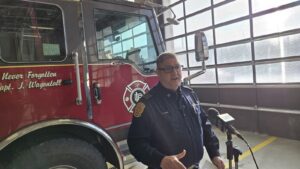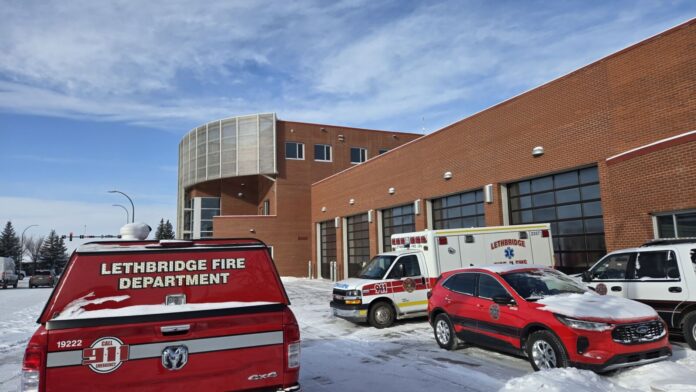It’s that time of year when the temperatures have dipped below zero across the province.
With that, Lethbridge Fire and Emergency Services is reminding everyone about the importance of safe heating practices.
LFES Chief Fire Marshall Troy Hicks says during the winter months, home-heating is the number one cause of fires that crews respond to in the city. He notes that the improper use of household items like stoves, or any electronics could have serious consequences.
“The stove and oven in your home is not designed to heat your home. That is a risk you do not need,” Hicks comments.
For items like space heaters or wood burning fireplaces, he says spacing is key and it is essential to leave at least a one-metre clearance area around the warming devices.
“You want to keep all combustibles at least one metre away from any appliance like that just due to the risk that they could heat up, they could dry out and they could catch fire,” Hicks says, adding spacing is also important for any children in the house to make sure they do not get hurt or knock the heating appliance over, sparking a blaze.
He says ventilation can make a life-changing difference, and with the current weather conditions, outdoor vents and exhaust pipes can get filled with snow, ice or other debris.
It is important to make sure those are not plugged. Hicks says that restricts proper ventilation, “which is going to be filling your home with carbon monoxide”.
THE SILENT KILLER
Hicks says carbon monoxide can pose a serious risk, as it’s odourless and can go unnoticed unless you have a proper detector. He recommends regularly checking the batteries on both your carbon monoxide detector and smoke alarm.
“It [carbon monoxide] is produced when you end up having any solid fuel appliances burning and when they don’t burn and support complete combustion of the materials, that’s when you get carbon monoxide, so we need to be careful with that. You want to make sure that all your appliances are working properly,” he explains.
Hicks adds that if you smell gas in your home, it is imperative to make sure everyone in the house, including pets, goes outside and 911 is called immediately.
VEHICLES
Due to the chilly weather, it is a common practice for drivers to plug in their car overnight to protect the vehicle’s engine. Hicks says you must remember to do that safely, which includes ensuring your extension cord is not damaged.
“I pulled my extension cord out to plug in my truck the other day and noticed it was frayed. I disposed of my extension cord, and I went and purchased a new one,” he says.
“If it’s cracked or if it’s frayed, you’re now posing a risk. It’s going to heat up and there’s always a risk of a fire.”
Hicks adds you should also ensure the cord coming from your vehicle is not damaged and if it is, bring it into a garage or your local dealership to get it fixed.

On the note of heating up your vehicle, he says although it may seem innocent enough, if your vehicle is parked inside a garage, you should avoid starting it up while it is indoors.
“You need to open the garage, take it outside and then start it and warm it up,” he comments. “Luckily if it’s parked inside, even if you don’t have a heater in your garage, you’re probably looking at a 10-to-15 degree difference for what your vehicle is compared to outside [so] it is not going to take long for that to heat up and be blowing nice, warm air.”
ROAD TRIPS
If you are planning a road trip for the upcoming Family Day long weekend, Hicks says there are some essential items to have in your vehicle.
These include things like a fully charged cell phone, blankets, extra toques, jackets and other warm winter gear.
“Always make sure your vehicle is full. In the winter months, I never let my vehicle get below half a tank. Just make sure you’re topped up,” he adds.
Hicks says if you do get stuck on the road, bundle up and head outside of the vehicle to call someone for help, as opposed to staying in your vehicle with it running.
He also suggests that if you are leaving your home for an extended time, unplug any electronic devices that will not be used to reduce the risk of an electrical fire.
Additionally, you can have a friend or neighbour check on your residence for any emergencies while you are away.
VULNERABLE POPULATION
Hicks says LFES has received reports of the homeless population seeking out discarded propane tanks for heating purposes. The Fire Marshall says this can be extremely risky, citing improper connections to the heating device as a danger.
“If those cables or hoses are not connected properly, or maybe there’s not a proper seal in there or an O-ring, or anything like that, that’s where the risk is, that’s when you’ve got leaking propane,” Hicks says.
He asks anyone with old, expired tanks to properly dispose of them at the hazardous household waste and electronic drop-off area at the Waste and Recycling Centre.
Hicks is reminding business owners to make sure they are not leaving anything in back alleys or around their property that could start fires, with the same advice applied to residence whose home backs onto an alleyway.
“I understand we want to do what we can to help people, but we want to make sure that we’re not leaving stuff out there that has the risk that someone could light in an alley and then therefore could spread to the building.”
More information about fire safety is available at the City of Lethbridge website. Hicks says anyone with questions or concerns can contact the local fire department for help.







